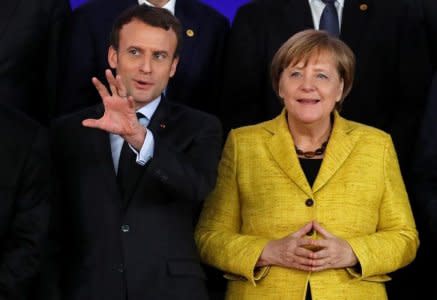Merkel and Macron look to turn warm ties into reform goals

Thomson Reuters
By Luke Baker
PARIS (Reuters) - Chancellor Angela Merkel and President Emmanuel Macron will spend more than five hours together in Paris on Friday, putting on a show of Franco-German unity as they try to agree on reforms to the euro zone.
At an EU summit in Brussels last month, the two said they hoped to come up with shared reform proposals by March, with Macron having pushed the idea of a standalone budget and a single finance minister for the currency bloc.
Merkel's efforts to form a coalition government in Germany have held back discussions with France, but the expectation she will manage to clinch another grand coalition with the centre-left Social Democrats has lent new impetus to the euro zone debate.
France and Germany, which account for 50 percent of euro zone output, are essential to the reform drive. Without agreement between them, any ambition to upgrade Europe's economic and monetary union and help the bloc withstand future crises is unlikely to get off the ground.
With the European Parliament holding elections next year, and Britain's exit from the European Union looming, 2018 is seen as the critical time to push through reforms.
Yet while Macron and Merkel have met and spoken by phone repeatedly in recent weeks, and French Finance Minister Bruno Le Maire held talks with his German counterpart Peter Altmaier in Paris on Thursday, there appears to be some way still to go before a common position on the core issues can be reached.
Speaking after his meeting with Altmaier, Le Maire hinted that it may be beyond March before agreement is found.
"We have ... an immediate priority, which is the completion of the banking union, the completion of the capital markets union and tax convergence with Germany," Le Maire said.
"On these three issues, our goal is to reach a final joint position between March and June."
NEW REFORMS OR OLD REFORMS?
When it comes to euro zone reform, while Germany and France often put on a strong show of political unity and shared intent, the devil is always in the detail.
Macron, elected in May on an avowedly pro-Europe platform, has set out grand plans, including suggesting at one point that the zone should have its own budget worth hundreds of billions of euros, an idea that does not sit well with Germany.
Talk of some sort of budget or separate allocation for the 19-country bloc remains, but its size - if it is ever agreed - is likely to be much smaller and it remains unclear how it would be established and how it would be deployed.
The idea of a single finance minister now appears to be a discussion for the future, and the suggestion that the euro zone's 500-billion-euro ESM rescue fund be turned into a European Monetary Fund to stabilize member states facing economic shocks still needs to be fleshed out.
Instead, discussions are focused on completing reforms that have already been agreed but not fully implemented, such as banking union, which aims to establish unified supervision and resolution rules across the euro area, and a capital markets union, which would do something similar for capital markets.
On banking union, Germany still has concerns about how risks will be shared. Progress has been made on supervision, which now falls under the European Central Bank, but the bloc has not yet agreed a mechanism for winding down troubled banks or a single deposit insurance scheme.
In that respect, the Merkel-Macron reform push may be as much about completing existing reforms as tackling new ones, which euro zone analysts still believe are necessary.
(Additional reporting by Noah Barkin in Berlin and Leigh Thomas and Marine Pennetier in Paris; Writing by Luke Baker; Editing by Andrew Roche)
See Also:

 Yahoo News
Yahoo News 
